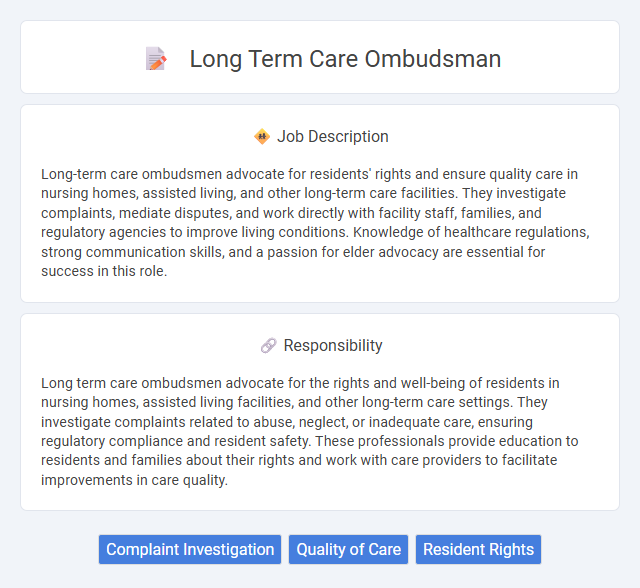
Long-term care ombudsmen advocate for residents' rights and ensure quality care in nursing homes, assisted living, and other long-term care facilities. They investigate complaints, mediate disputes, and work directly with facility staff, families, and regulatory agencies to improve living conditions. Knowledge of healthcare regulations, strong communication skills, and a passion for elder advocacy are essential for success in this role.
Individuals with strong empathy and effective communication skills are likely suitable for a Long Term Care Ombudsman role, as it involves advocating for the rights and well-being of elderly or disabled residents in care facilities. Those comfortable addressing sensitive issues and navigating complex regulatory environments may find this job aligns well with their capabilities. Conversely, people who prefer low-stress, routine tasks might find the emotional and sometimes confrontational nature of this work less suitable.
Qualification
A Long Term Care Ombudsman typically requires a high school diploma or equivalent, with many positions preferring a bachelor's degree in social work, nursing, or a related field. Essential qualifications include strong communication skills, knowledge of elder care regulations, and experience in advocacy or case management. Certification or training in long-term care ombudsman programs further enhances job readiness and effectiveness.
Responsibility
Long term care ombudsmen advocate for the rights and well-being of residents in nursing homes, assisted living facilities, and other long-term care settings. They investigate complaints related to abuse, neglect, or inadequate care, ensuring regulatory compliance and resident safety. These professionals provide education to residents and families about their rights and work with care providers to facilitate improvements in care quality.
Benefit
The Long Term Care Ombudsman role likely offers significant benefits by providing advocates who help protect the rights and well-being of residents in nursing homes and assisted living facilities. This position may enhance community trust and improve the quality of care through effective complaint resolution and policy recommendations. It probably fosters strong relationships with residents, families, and care providers, creating a more supportive and informed care environment.
Challenge
The Long Term Care Ombudsman job likely involves navigating complex regulatory environments and addressing sensitive issues faced by elderly residents in care facilities. Challenges may include advocating for residents' rights while managing conflicts between families, facility staff, and healthcare providers. Effective communication and persistence are probably essential to overcoming barriers and ensuring quality care for vulnerable populations.
Career Advancement
A Long Term Care Ombudsman plays a critical role in advocating for residents' rights and improving quality of care in nursing homes and assisted living facilities. Career advancement opportunities include progressing to senior ombudsman roles, policy advisor positions, or leadership roles within state and national ombudsman programs. Gaining specialized certifications, such as Certified Ombudsman or roles in elder law and public health, enhances prospects for higher-level management or advocacy careers.
Key Terms
Complaint Investigation
The Long Term Care Ombudsman specializes in complaint investigation by addressing grievances from residents of nursing homes and assisted living facilities. They conduct thorough interviews, review records, and collaborate with facility staff to resolve issues related to care quality, residents' rights, and safety concerns. Their role is crucial in advocating for long-term care residents and ensuring compliance with state and federal regulations.
Quality of Care
Long term care ombudsmen play a critical role in ensuring the quality of care for residents in nursing homes and assisted living facilities by advocating for their rights and investigating complaints related to neglect, abuse, or substandard conditions. They work closely with healthcare providers, facility staff, and families to promote compliance with federal and state regulations, improve resident safety, and enhance overall living conditions. Monitoring care plans, facilitating conflict resolution, and educating stakeholders on best practices contribute significantly to maintaining high standards of care in long-term residential settings.
Resident Rights
Long term care ombudsmen advocate for resident rights by investigating complaints related to abuse, neglect, and violations of dignity in nursing homes and assisted living facilities. They ensure residents receive proper care in accordance with federal and state regulations, promoting autonomy and quality of life. Ombudsmen provide education on resident rights and work with facilities to resolve issues while maintaining confidentiality and respect.
 kuljobs.com
kuljobs.com